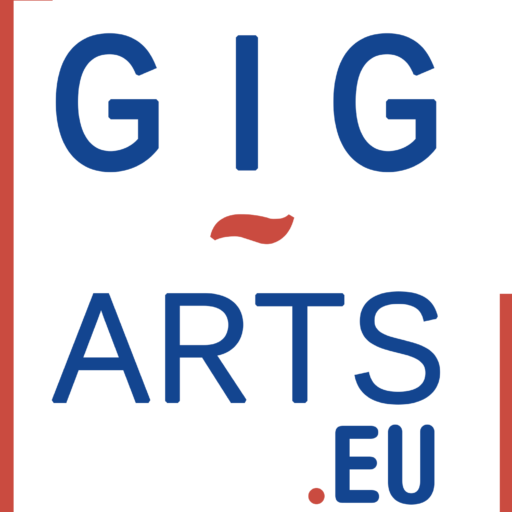Session Chairs, Roundtable and Keynote Speakers
Nayia Barmpaliou is a Policy Coordinator and Programme Manager for Cyber and Organised Crime at the European Commission’s Directorate General for International Cooperation and Development. Since 2013, she oversees the EU’s external cyber capacity building efforts from a strategic and operational perspective, including being responsible for designing and managing a multi-million-euro external assistance portfolio for global and trans-regional projects that address cybercrime and cybersecurity, as well as providing thematic advice and quality review to EU services on bilateral and regional cyber/digital projects. Barmpaliou also liaises with other EU services to ensure internal and external policy coherence on cyber-related issues, and leads on the EU’s exchanges and coordination with other governments, organisations and donors active in international cyber capacity building. In this role, she represents the EU in relevant fora, such as the T-CY Cybercrime Convention Committee, the UNODC Intergovernmental Experts Group on Cybercrime, and the Global Forum on Cyber Expertise. |
 Andrea Beccalli, ICANN Andrea Beccalli, ICANNAndrea Beccalli joined ICANN in 2013 and is now the Director of the Stakeholder Engagement Team. In his role, Andrea’s responsibilities include working on ICANN’s engagement with the European governments, Internet communities, the EU bodies, as well as the European-based IGOs. Prior to working at ICANN, Andrea served as Policy and Advocacy Manager for the International Federation of Libraries Association and Institutions (IFLA) in The Hague, Netherlands, where he strengthened IFLA relationship with the UN systems and libraries’ contribution to the UN Millennium Development Goals. He was also an Associate Expert at UNESCO’s Knowledge Societies Division, Communication and Information Sector in Paris, France, where he worked at the Organization’s involvement in WSIS, Internet Governance, and negotiated the 2009 partnership agreement between UNESCO and ICANN. In Spring 2012, Andrea worked in Iraq for the NGO Internews EU on a policy study on Internet and Freedom of Expression in the country. Andrea holds a MA degree from The Fletcher School of Law and Diplomacy in Medford, and a MA in International Relations from the Barcelona Institute of International Studies and a BA in Political Science from the University of Rome. |
 Andrea Calderaro, Cardiff University, Centre for Internet and Global Politics Andrea Calderaro, Cardiff University, Centre for Internet and Global PoliticsAndrea Calderaro is the director of the Centre for Internet and Global Politics, and a Lecturer in International Relations at the Department of Politics and International Relations/School of Law and Politics at Cardiff University. He holds his PhD in Social and Political Sciences from the European University Institute. His research centres on Internet and International Affairs, with a particular focus on internet governance, cybersecurity, cyber capacity building, telecom policies, digital rights and freedoms, ICTs for development, and the role of the EU in the global internet policy debate. He turns his scholarly relevant research into practice having served as a consultant to the House of Lords, UK Cabinet, a member of the “EU Cyber Capacity Building” Task Force (EC DG-DevCo/EUISS), a member of the UNESCO “Internet Universality Program” Advisory Board, a member of the Global Internet Policy Observatory’s Advisory Group of the European Commission, and a member of the Civil Society Information Society Advisory Council board at the OECD. Dr. Calderaro is also an Editor of the “Digital Technologies and Global Politics” Book Series at Rowman & Littlefield, an Associate Editor of the International Journal of E-Politics, and he has served as Chair of the ECPR Internet & Politics standing group. With his work, he has appeared on Al Jazeera “Inside Story”, BBC, Rai News 24, The Verge, New York Times, and Open Democracy. Twitter @andreacalderaro |
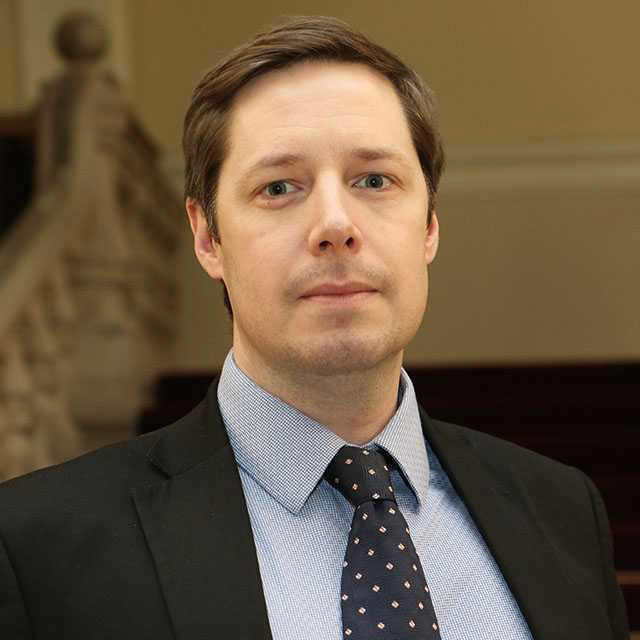 Robert Collett, Head of National Cyber Security Programme, International, UK Foreign and Commonwealth Office Robert Collett, Head of National Cyber Security Programme, International, UK Foreign and Commonwealth OfficeRobert is responsible for managing the international projects of the UK’s National Cyber Security Programme. He is working on: international cyber security capacity building; supporting ICT4Development and internet access initiatives with good cyber security; and identifying and sharing good practice in cyber security capacity building. As a diplomat, he has previously served in Iraq, Sierra Leone and Afghanistan. |
 William Drake, University of Zurich William Drake, University of ZurichWilliam J. Drake is an International Fellow and Lecturer in the Department of Communication and Media Research, University of Zurich. Previously he taught at the School of Advanced International Studies, Georgetown University, and the University of California, San Diego, and co-edited the MIT Press book series, The Information Revolution and Global Politics. Some Internet governance activities have included: faculty member, the European, South and African schools on Internet governance; Vice Chair and founding Steering Committee member, Global Internet Governance Academic Network; advisor to the World Economic Forum’s Digital Economy and Society Initiative and the Panel on Global Internet Cooperation and Governance Mechanisms; member, Multistakeholder Advisory Group, IGF; member, UN Working Group on Internet Governance; member, Coordination Committee, NETmundial Initiative; member, Coordination Committee, 1Net initiative; member, High-Level Advisors, UN Global Alliance for ICT and Development; and 3 terms as Chair of the NonCommercial Users Constituency, 7 terms on the Board of Euralo, 2 terms on the Nominating Committee, and 2 terms on the Generic Names Supporting Organization Council, all in ICANN. PhD in Political Science, Columbia University. Recent publications include: W. Drake, V. Cerf & W. Kleinwachter, Internet Fragmentation: An Overview (2016); editor, The Working Group on Internet Governance: 10th Anniversary Reflections (2016); co-editor, Internet Governance: The NETmundial Roadmap (2014). www.williamdrake.org. |
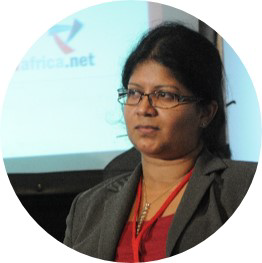 Helani Galpaya, LIRNEasia Helani Galpaya, LIRNEasiaHelani Galpaya is CEO of LIRNEasia, a pro-poor, pro-market think tank working on infrastructure policy and regulatory issues across the emerging Asia Pacific. She serves on the Board of Directors of the Global Partnership for Sustainable Development Data (GPSDD), the Multistakeholder Advisory Group (MAG) of the UN Internet Governance Forum, the Board of Editors of the Information Technology and International Development journal and the Advisory Board of the Harnessing and Sharing Economy for Local Development initiative of the Centre for Implementation of Public Policies promoting Equity and Growth (CIPPEC), Argentina. She was an Advisor to the UN Broadband Commission’s Working Group on Bridging the Gender Divide. She researches and engages in public discourse on issues related to internet governance, policy and regulatory barriers to bridging the digital divide, big data, digitization and the future of work, inclusive agriculture value chains. |
 Katharina Höne, DiploFoundation Katharina Höne, DiploFoundationKatharina E Höne is a research associate in diplomacy and global governance at DiploFoundation. Her research focuses on issues located at the intersection of technology and diplomacy and science diplomacy. She has extensive experience in speaking, training, and capacity building in this area and recently completed a research project on big data diplomacy, commissioned by the Finnish Ministry of Foreign Affairs. She also teaches extensively on issues in diplomacy, both traditional and new, and global governance. She completed her doctorate in International Relations theory at the Department of International Politics, Aberystwyth University. She also holds a master’s degree in Diplomatic Studies from the University of Leicester. She is active on Twitter as @kathone and contributes to DiploFoundation’s blog at https://www.diplomacy.edu/blog |
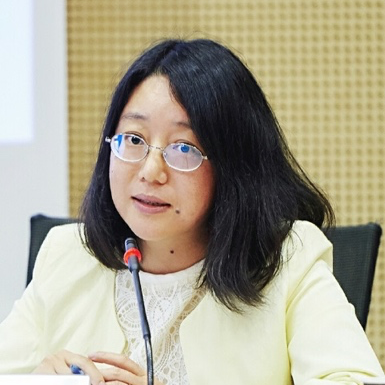 Xianhong Hu, UNESCO Xianhong Hu, UNESCOXianhong Hu, the program specialist at Division of Freedom of Expression and Media Development, Communication and Information Sector of UNESCO Headquarter in Paris since 2006. Her main responsibilities are in the areas of freedom of expression online and offline, Internet privacy, media development and Internet governance and she has followed the process of the World Summit of the Information Society (WSIS) and Internet Governance Forum (IGF). She was involved in developing UNESCO Internet Universality framework and the strategic study Keystones to foster inclusive Knowledge Societies: Access to information and knowledge, freedom of expression, privacy and ethics on a global Internet”. She is managing UNESCO ongoing project “Defining Internet universality Indicators”. She managed UNESCO program on promoting online freedom of expression and Internet privacy and conducted Series Publication on Internet Freedom which has captured captured the complex dynamics of global Internet governance and increasing challenge to Internet freedom, by studying a variety of subject including online freedom of expression, privacy, Internet intermediaries, digital safety, etc. She has also conducted UNESCO Series Publication on investigative journalism including “Story-Based Enquiry: A Training Manual for Investigative Journalism” and “Global Casebook of Investigative Journalism”. She received a PhD from School of Journalism and Communication at Peking University in China in 2007. |
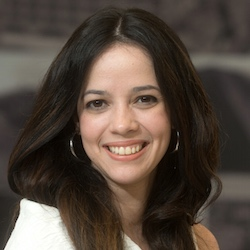 Marilia Maciel, DiploFoundation / Global Commission on the Stability of Cyberspace Marilia Maciel, DiploFoundation / Global Commission on the Stability of CyberspaceMarilia Maciel is a Digital Policy Senior Researcher at DiploFoundation. Previously, she was a researcher and coordinator of the Center for Technology and Society of the Getulio Vargas Foundation (CTS/FGV) in Rio de Janeiro. She serves as a councilor at ICANN´s Generic Names Supporting Organization (GNSO) representing the Non-commercial Stakeholder Group (NCSG). Marília is a former member of the Working Group on improvements to the Internet Governance Forum (2011-2012), created under the auspices of the Commission on Science and Technology for Development (UN CSTD). She was also a member of the Multistakeholder Executive Committee of NETmundial and she represented CTS/FGV in meetings of the Committee on Copyright and Related Rights (SCCR) of the World Intellectual Property Organization (WIPO). Marília is a PhD candidate at the University of Bordeaux Montaigne, on Information and Communication Sciences. She holds a Master’s degree in Latin American Integration from the Federal University of Santa Maria (2008) and a law degree from the Federal University of Pernambuco (2005), where she was awarded with a research grant from the State of Pernambuco Research Foundation (FACEPE) to investigate issues related to taxation and electronic commerce. |
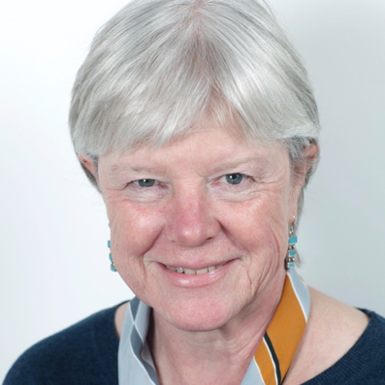 Robin Mansell, London School of Economics Robin Mansell, London School of EconomicsRobin Mansell is a Professor of New Media and the Internet in the Department of Media and Communications, at London School of Economics and Political Science (LSE). She has training in several social science disciplines including psychology, social psychology, politics and economics and is a strong advocate of interdisciplinary research. Her research and teaching focus on the governance of digital media and communications; the social, economic and policy issues arising from innovations in digital technologies; the interactions between technical design and the structure of markets; and sources of regulatory effectiveness and failure. She is member of the Board of Directors of TPRC (Research Conference on Communications, Information and Internet Policy), served as Head of the Media and Communications Department at LSE, was President of the International Association for Media and Communication Research, and Scientific Chair of the EURO Communications Policy Research Conference. |
 Meryem Marzouki, CNRS France Meryem Marzouki, CNRS FranceMeryem Marzouki is a Senior Academic Researcher in Political Sciences with the French National Scientific Research Center (CNRS), currently with LIP6 Laboratory at Sorbonne Université in Paris, where she runs a multi-disciplinary research activity focusing on Internet governance actors, issues, and institutionalization processes. She also teaches Internet Regulation and Governance at MSc level to UPMC Computer Sciences students. Marzouki pioneered the GIG-ARTS Conference Series, organizing its 1st edition in 2017 in Paris on the theme: “Global Internet Governance as a Diplomacy Issue”. More details available at: https://www-npa.lip6.fr/marzouki/ |
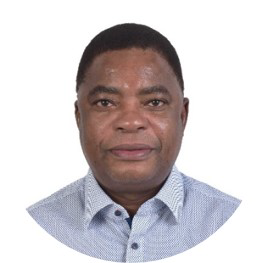 Mike Nxele, International Telecomunication Union (ITU) Mike Nxele, International Telecomunication Union (ITU)Mike Nxele is the Senior Human Capacity Building Officer within the Human Capacity Building division of the Bureau of Telecommunications Development of the International Telecommunication Union (ITU). He is based at the ITU Headquarters in Geneva. Among his responsibilities, Mike supports ITU member states and sector members in developing their human capacities to fully leverage the benefits of ICTs. One of the areas specific areas of focus for capacity building within ITU is Internet Governance. Mike has worked in the telecommunications sector for more than 25 years. Prior to joining ITU in 2002, Mike Nxele worked as Human Resources Director within the incumbent fixed telecommunications organization in his native country, Zimbabwe. |
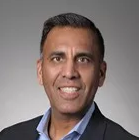 JP Singh, University of Edinburgh JP Singh, University of EdinburghJP Singh is the Chair of Culture and Political Economy, and Director of the Centre for Cultural Relations at the University of Edinburgh. Alongside this role, Singh is the editor of the journal, ‘Arts and International Affairs’ and also Stanford’s book series on Emerging Frontiers in the Global Economy. In total, Singh has authored five monographs, edited three books, and published dozens of scholarly articles. In policy work, Singh has advised international organizations such as UNESCO, the World Bank, and the World Trade Organization. He was also co-principal investigator for the official report to the United States President William J. Clinton from the White House Commission on Asian Americans and Pacific Islanders in 1999-2000. From 2000-2003, he was co-PI for a Development Marketplace Grant from The World Bank, which led to implementing a crafts and technology project for women’s empowerment in District Kangra in North India. Singh has also played a leadership role in several professional organizations including chairing three different sections of the International Studies Association and, for six years, the Science, Technology, and Environmental Politics (STEP) section of the American Political Science Association. Singh holds a PhD in Political Economy and Public Policy from the University of Southern California. |
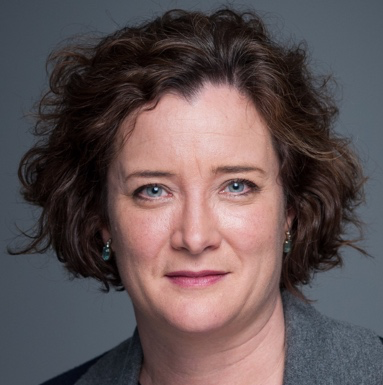 Emily Taylor, Chatham House Emily Taylor, Chatham HouseEmily Taylor is an associate fellow of Chatham House and editor of the Journal of Cyber Policy. She is also the CEO of Oxford Information Labs and Co-Founder and Director of Netistrar Ltd, a UK Domain Name Registrar. Taylor’s research publications include: The Internet in the Gulf (Chatham House); ‘ICANN: Bridging the Trust Gap’ and ‘Privatisation of Human Rights’ for the Global Commission; the annual World Report on Internationalised Domain Names (lead author); and reports for the UK regulator, Ofcom, as well as a review of ICANN’s policy development process. She chaired the independent WHOIS Review Team for ICANN, as well as serving on the Internet Governance Forum’s Multistakeholder Advisory Group, and as part of the Global Commission on Internet Governance Research Network. She has written for the Guardian, Ars Technica, and the New Statesman, and has appeared on the BBC Now Show. Taylor has an MBA in Business, Strategy, Finance, Marketing, Corporate Governance from the Open University, and an LPC from College of Law, London. |
 Emiliano Trerè, Cardiff University Emiliano Trerè, Cardiff UniversityEmiliano Trere is a Lecturer at Cardiff’s School of Journalism, Media and Cultural Studies. His research addresses the issue of digital activism from a theoretical standpoint in relation to crucial questions of culture and identity on one side, and to the development of theoretical frameworks related to media theories of change as mediation, media ecologies, and mediatization on the other. His publications include three co-edited special issues “Social Media and Protest Identities” (Information, Communication & Society, 2015), “Latin American Struggles & Digital Media Resistance” (International Journal of Communication, 2015), and “From Global Justice to Occupy and Podemos: Mapping Three Stages of Contemporary Activism” (tripleC, 2017). Emiliano is the author of Complexities of Digital Activism: Ecologies, Imaginaries, Algorithms, and co-editor of Citizen Media and Practice (both books forthcoming with Routledge). Emiliano is the cofounder of the “Big Data from the South” Research Network that aims to grasp and interrogate the diverse techno-cultural practices that subvert the dominant narratives of datafication as theorized and narrated by the global north. |
